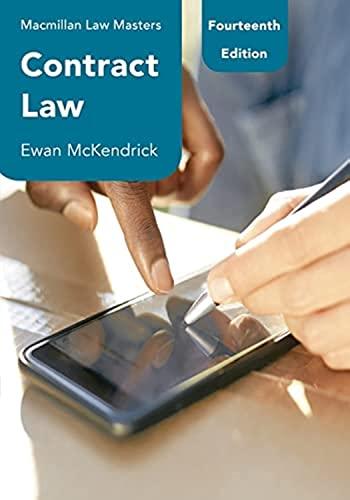Question
You must cite and explain relevant precedent and constitutional provisions to solve this hypothetical problem. Must use the case Wickard V. Filburn (1942) You must
- You must cite and explain relevant precedent and constitutional provisions to solve this hypothetical problem. Must use the case Wickard V. Filburn (1942)
- You must consider relevant counterarguments and respond to them.
Hypothetical Scenario:
Fed up with the presence of genetically modified organisms in food, Republicans and Democrats in Congress, in agreement with the President, find bipartisan agreement to regulate the grocery trade.
In passing new agricultural legislation deemed the Ensuring Access to Nourishment in Commercial Enterprises (EAT NICE) Act, Congress establishes a new program governing the terms of purchase contracts executed between (a) local commercial grocers and (b) their agricultural suppliers AND (a) major commercial grocers, including but not limited to Whole Foods. Kroger Co., Publix, Trader Joe's, and Albertsons and (b) their agricultural suppliers.
The EAT NICE Act permits the Secretary of Agriculture, jointly with the commissioner of the Food and Drug Administration (an agency in the Department of Health and Human Services), to impose fines on any grocer who arranges to purchase genetically modified produce from farming outfits. The fines to be levied would be in an amount not greater than $100000 per store operated by the grocer firm scheduled to sell the GMO produce. The legislation does not cover prepackaged meals that contain genetically modified fruits and vegetables.
A group of farm organizations and grocer firms jointly initiate litigation challenging the EAT NICE Act. Specifically, the farm organizations and local grocer firms argue that, in their case, the GMOs did not travel in interstate commerce, but were instead grown, sold, and consumed locally. In addition to that, the farm organizations, local grocer firms, and major commercial grocers argue that Congress, by adopting the EAT NICE Act, is not regulating an economic activity but is attempting to regulate what people eat. On the other hand, Congress argues that the enumerated power to regulate interstate commerce enables them to adopt and enforce this legislation.
You are the judge deciding the case. Using relevant precedent, explain whether the EAT NICE Act as a whole, or specific parts of it, are unconstitutional or not, and why or why not.
Step by Step Solution
There are 3 Steps involved in it
Step: 1

Get Instant Access to Expert-Tailored Solutions
See step-by-step solutions with expert insights and AI powered tools for academic success
Step: 2

Step: 3

Ace Your Homework with AI
Get the answers you need in no time with our AI-driven, step-by-step assistance
Get Started


